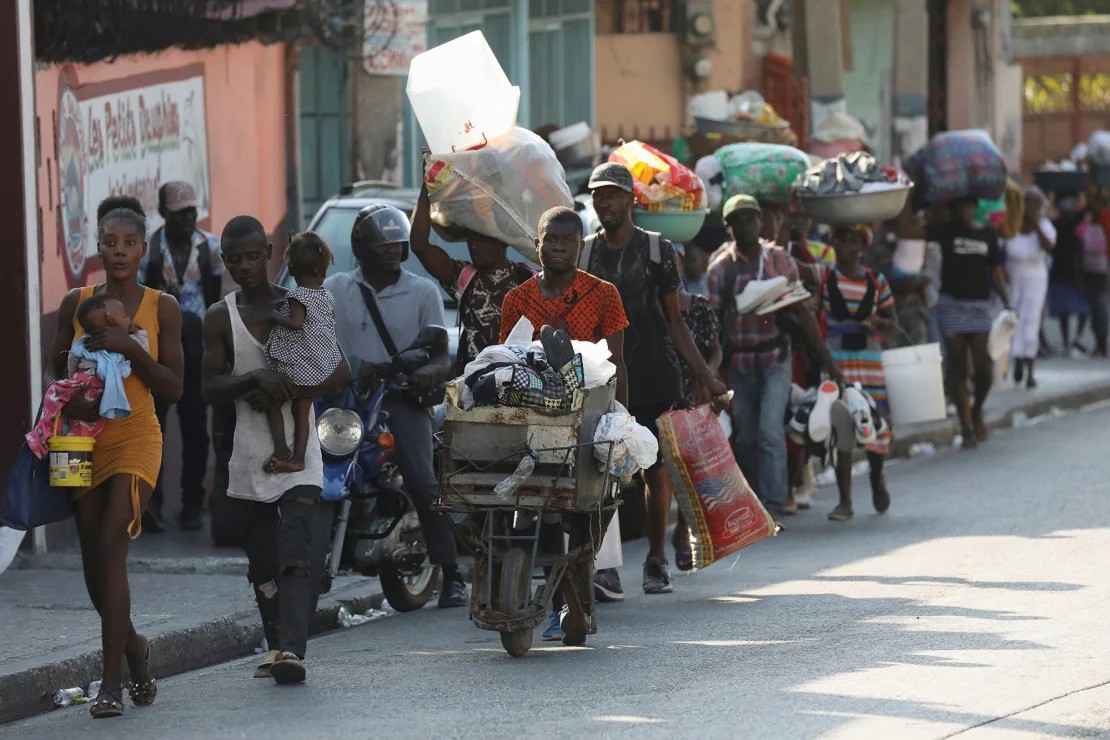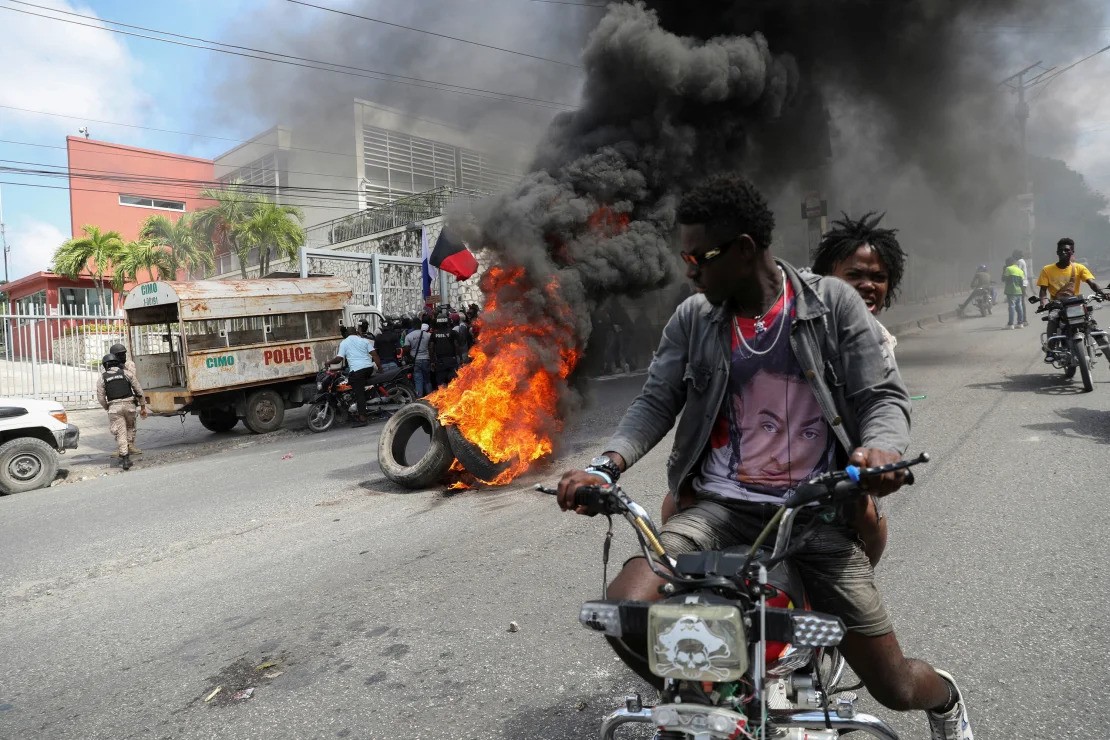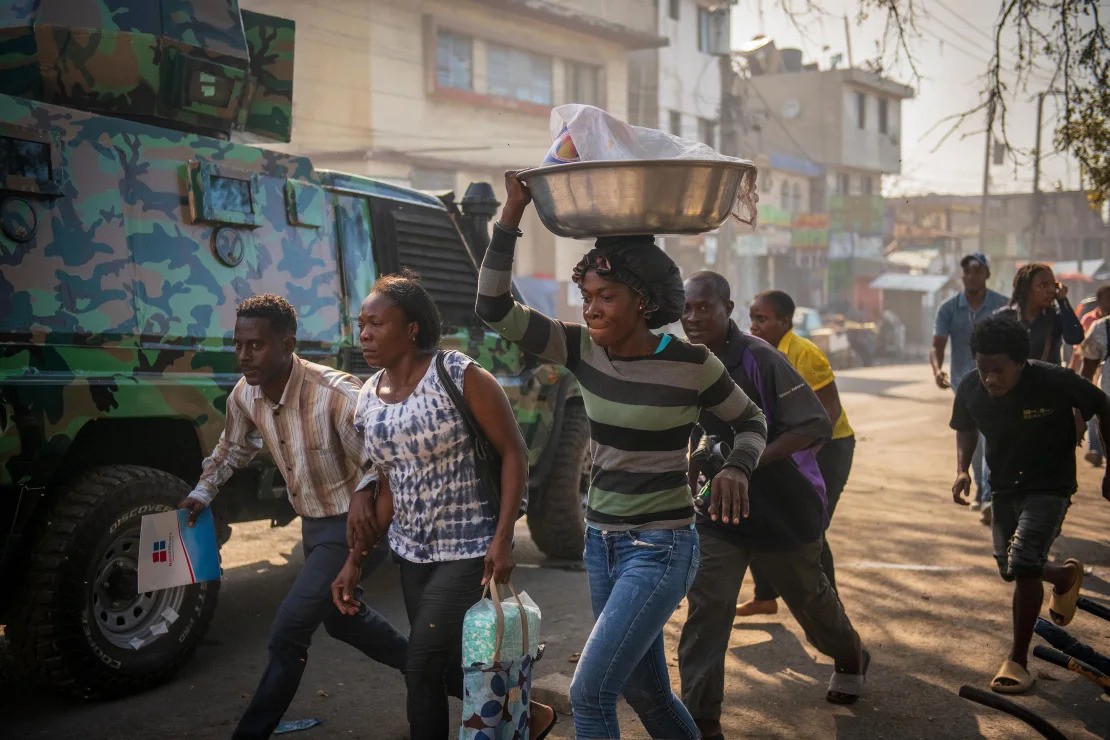Gangs Rule Over Haiti's Capital, Calling For Prime Minister's Resignation
Gangs rule over Haiti's capital, calling for Prime Minister's resignation. Looking down from above, the capital city of Haiti, Port-au-Prince, still presents a serene view, with its white-washed homes nestled on steep green hills surrounding a shimmering bay.
Author:Paula M. GrahamReviewer:Rhyley CarneyMar 04, 2024494 Shares13K Views

Gangs rule over Haiti's capital, calling for Prime Minister's resignation. Looking down from above, the capital city of Haiti, Port-au-Prince, still presents a serene view, with its white-washed homes nestled on steep green hills surrounding a shimmering bay.
However, setting foot on its cracked streets demands a careful weighing of risks and rewards. The city is under the grip of ruthless gangs, terrorizing the population, dividing neighborhoods into warring criminal territories, and isolating Haiti's international port from the rest of the country.
In this urban landscape, the most widely circulated online videos often depict scenes of torture, recorded and shared by gangs to spread fear and expedite ransom payments for the thousands of kidnapping victims. Just last month, they began receiving forwarded messages from contacts, sharing the latest horrifying footage - a bound woman writhing in agony amidst flames, as her captors mocked her.
It provided a glimpse into the pervasive daily anguish of life in Haiti, where frequent civilian protests underscore the population's reaching a tipping point. UN estimates suggest that gangs hold sway over 80% of the capital and are vying to extend their control further.
In recent days, Port-au-Prince has been rocked by a series of meticulously coordinated gang assaults, with armed factions torching police stations and liberating prisoners, in what one gang leader labeled a direct challenge to the unpopular Prime Minister Ariel Henry. On Sunday, Haiti's government declared a state of emergency following reports of thousands of inmates escaping from its largest prison.
"We have chosen to take our destiny in our own hands. The battle we are waging will not only topple Ariel’s government. It is a battle that will change the whole system," said Jimmy "Barbeque" Cherizier, a former police officer who styles himself as Robin Hood figure in his territory, in a statement reported by local media. Henry's location is currently unknown following a trip to Kenya last week.
The Country Cannot Continue Like This
Each passing year has only deepened the woes of Haiti, with every new disaster delivering another blow to the crumbling state. In downtown Port-au-Prince, the iconic National Palace, still in ruins from the devastating 2010 earthquake, stands as a haunting reminder. Adding to the chaos, multiple courthouses in the area have fallen under the control of gangs.
Many Haitians hold their prime minister accountable for the swift encroachment of gangs over the past three years, coupled with his refusal to facilitate elections that could usher in a new government and a fresh start for the nation. While Henry and his supporters argue that the current state of insecurity would hinder a fair electoral process, such justifications fail to pacify the widespread anger.
Earlier this month, amidst rumors circulating in a Port-au-Prince neighborhood about the imminent closure of a local police station, frustrated residents took to the streets in protest. Toppling a bus and igniting tires, they demanded Henry's removal, expressing their exasperation with the status quo.
"Ariel Henry has to go," one protester shouted. "We are living in total precarity. We're living on trash, on sewage. I have nothing, I'm empty. I can't go to work, I can't support my family, I can't send my kids to school."
Even some members of the gangs find the current level of brutality intolerable.
"I see people dying in front of me every day," one 14-year-old gang recruit from the city's Martissant neighborhood told reporters, visibly distraught, in an interview last month. "The thing I hate the most is when (other gang members) kill someone and they make me burn the body," he said.
He adds that one of his friends, who is also a gang member, was killed and burned a few days ago. "I don’t want that to happen to me," he says.
"The sentiment on the ground is that the country cannot continue like this. The level of violence that people are exposed to is inhumane," United Nations deputy special representative in Haiti Ulrika Richardson warned in a press briefing in New York Wednesday.
80% Of Port-au-Prince Controlled By Gangs
On platforms like TikTok and WhatsApp, accounts flaunting guns and luxurious cars boast of their ties to groups such as the 5 Segond gang, 400 Mawozo (infamous in the US for the 2021 abduction of over a dozen foreign missionaries), and Kraze Barye, whose leader has a nearly $2 million FBI bounty on his head.
Haiti's gangs were once viewed as tools of powerful politicians and business elites. However, they now appear to have broken free from their constraints; the gangs dominating Port-au-Prince have transformed into independent "violent entrepreneurs," as outlined in a recent analysis by the Global Initiative Against Transnational Organized Crime.
In a country ravaged by poverty with few resources to exploit, the gangs are treating individuals as commodities. Last year alone, they abducted at least 2,490 people from the streets to fuel a rapidly expanding kidnapping industry, according to UN statistics.
Victims whose families cannot afford their ransom are often murdered, adding to the thousands who have already lost their lives to indiscriminate gunfire, rampant arson, and other atrocities. Haiti's national homicide rate doubled last year, reaching 41 murders per 100,000 people, making it one of the highest murder rates globally, as reported by the UN.
Haiti's National Police, equipped with a newly formed anti-gang unit, has achieved some victories in capturing criminal leaders and preventing gang proliferation in crucial parts of the city, including areas adjacent to the US embassy. However, faced with nearly 100 burgeoning gangs in the metropolitan region, the police force lacks the necessary resources and training to fully quell the unrest in the country, sources reveal. According to UN data, Haitian police officers are resigning in large numbers, with 1,663 officers leaving their positions in 2023 alone.
As Hunger Spreads, Popular Anger Grows
One morning in the Delmas neighborhood, numerous women from the nearby gang-controlled slum of Cité Soleil queued up to receive food aid from the UN's World Food Programme, distributed by the Catholic charity St. Kizito.
People recounted experiences of brutality; one woman shared her ordeal of being raped by a gang member, displaying scars on her arm as evidence of the assault. Another widow recounted the tragic death of her husband, who was burned alive inside their family home during a clash between rival gangs.
"I was at home with my family, when a rival group to our local gang attacked the neighborhood. I had the time to run with my child, but my husband was too slow behind us. They burned the house down with him inside."
Over 300,000 civilians have been displaced due to inter-gang warfare, according to the UN. Meanwhile, in the southern coastal city of Jeremie, an administrator at St. John Bosco School reported that at least 20 new students had arrived from the capital with their families since the beginning of 2024. Some fled so hastily that they brought no clothes or identification documents.
However, in rural areas, hunger looms as a significant threat. Gangs' control over crucial roads in and around Port-au-Prince has severely impeded the transportation of essential imported food and fuel across the country. Exorbitant bribes are demanded for safe passage. According to World Bank estimates, prices are skyrocketing to unsustainable levels for a population where over 60% of households survive on less than $4 per day.
One market vendor in Jeremie reported that the wholesale price for a sack of sugar had surged from $50 to $150. Similarly, the cost of a bag of rice, a staple in Haitian cuisine, has escalated from $40 to $120.
The strain of trying to manage expenses under these circumstances is causing tension within the community. In January, rioters targeted the St. John Bosco school, attempting to breach its gates and access food supplies provided by the UN's World Food Programme, as stated by the administrator.
The food was designated for the school's impoverished students, often their sole meal of the day. However, since the incident, the frightened children have not returned.
Anger Boils Over
From the smoke-filled streets of the capital to farmworkers wielding their machetes in the fields of Jeremie, a recurring angry chant was heard: "Ariel kraze peyi a, Ariel kraze peyi a." Translated, it means "Ariel is destroying the country."
Prime Minister Ariel Henry, trained as a neurosurgeon, assumed office in 2021 with the support of the United States, Canada, and other key allies, following the assassination of former President Jovenel Moise.
However, the position proved to be a poisoned chalice; even then, gangs held sway over more than half of Port-au-Prince. Henry pledged to restore order and conduct elections, but two and a half years later, the world's first free Black republic is further than ever from those democratic principles. Haiti's last elections took place in 2016, and most terms have long expired, leaving elected positions vacant, including the presidency and the entire legislature.
It's a fertile ground for political opportunists. Earlier this month, Guy Philippe, a rebel leader who was recently extradited by the United States to Haiti after serving a sentence for money laundering, rallied for a revolution. In some videos, members of the Haitian Environment Ministry's security brigade (BSAP) appeared alongside him, raising concerns about a state security force going rogue.
“„We are battling to change a system which is not working for any Haitian, in which no one can live, no matter who they are… We are loyal to the government, but it is not loyal to us.- BSAP commander, Inspector Odric Octina
"Any revolution that can free the Haitian people from this dictatorship, we are ready to stand with it," he said, adding the caveat that BSAP does not intend to turn their arms against the government and that his only action so far had been to participate in protests in Port-au-Prince.
Meanwhile, the gangs have displayed no hesitation in launching direct attacks on government institutions. As armed groups besieged the National Penitentiary, one of Haiti's police unions issued a desperate plea for reinforcements on Saturday, addressing it to X.
They warned that if the prison's inmates were released to join the already rampant gangs, "we are done. No one will be spared in the capital." By the day's end, the prison had been breached, with over 3,500 prisoners believed to have escaped, according to UN estimates.
Violence persisted throughout the weekend, prompting Haiti's government to declare a state of emergency in the West department, where Port-au-Prince is situated, and implement a curfew from 6 pm to 5 am in an attempt to "regain control of the situation."
Hope In A Foreign Uniform
February 7 was the designated date for a new elected government to assume power in Haiti, as per an agreement between Henry's administration and a coalition comprising influential figures from Haiti's civil society and business sector.
However, the required elections were never conducted. Last month, Henry could only deliver a rare national address, urging patience as the deadline passed. He implored citizens to "come together to save Haiti," acknowledging the pressing need for collective action.
“„The principal task of this transitional government is to create the conditions in which elections can be organized. My interim government is working hand-in-hand with the police to restore normal life in the country. We are aware that many thing have to change, but we need to make those changes together and calmly.- Prime Minister Ariel Henry
A new transition deadline has been put forward: Leaders of the regional bloc Caricom announced last week that Henry had consented to hold general elections by August 31, 2025, at the latest. Until then, Henry's prospects for stability may hinge on an external intervention beyond his influence: the military support force led by Kenya, which his government requested last year and was approved by the United Nations Security Council.
"The reason why the Prime Minister requested the UN resolution back in October 2022 is because the police department and other forces cannot challenge the gangs," Henry's advisor Jean Junior Joseph told reporters.
He also mentioned that directing anger toward the government for Haiti's gang problem is misdirected, emphasizing that the government's options are severely limited.
"The situation is so complicated that the gangs have more ammunition than us," he said.
The Prime Minister's office declined the request for an interview. Foreign military interventions are met with deep skepticism in Haiti, where UN peacekeepers are associated with sex abuse scandals and the tragic outbreak of cholera. The specifics of how the Kenyan-led mission will operate and what human rights precautions its forces will implement remain unclear.
Nevertheless, Haitian security forces interviewed expressed their approval of the assistance. The United States, a primary destination for Haitian migrants escaping the nation's unrest, has also pledged support for the mission with a commitment of $200 million.
It might not be a coincidence that the recent surge in gang violence coincided with Henry's visit to Nairobi last week to finalize an agreement supporting the mission. The stakes are considerable: If the pledged 1,000-plus troops materialize, the foreign intervention is anticipated to present a significant obstacle to gang dominance - potentially reigniting prospects for reform in the nation and affording the embattled premier some respite.
However, if the mission doesn't materialize promptly, experts and government insiders caution that the escalating pressure due to Haiti's intolerable violence is likely to reach a breaking point.

Paula M. Graham
Author

Rhyley Carney
Reviewer
Latest Articles
Popular Articles

